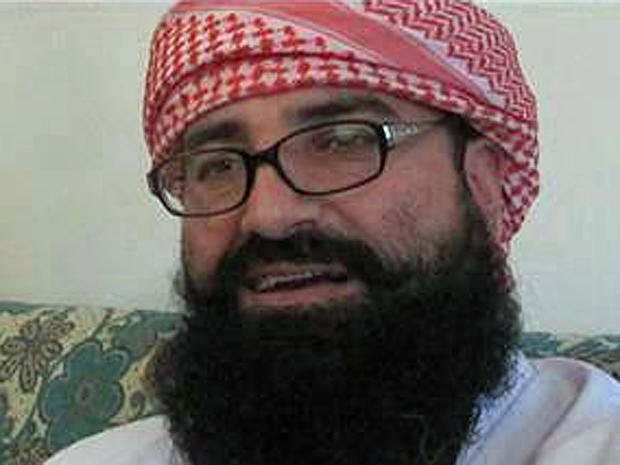Pakistan drone strike kills top Haqqani network commander Maulawi Ahmed Jan at Islamic seminary
PARACHINAR, Pakistan -- A suspected U.S. drone carried out a rare missile strike in northwest Pakistan outside the country's remote tribal region on Thursday, killing six people, including a senior leader of the powerful Haqqani terror network, Afghan intelligence and militant sources told CBS News.
Local commanders from the Haqqani and the Afghan Taliban confirmed to CBS News' Sami Yousafzai that Maulawi Ahmad Jan was killed in the strike -- the second senior member of the Haqqani network to die in the space of a couple weeks.
The missiles hit an Islamic seminary in Hangu district in Khyber Pakhtunkhwa province that was known to be visited by senior members of the Afghan Haqqani network, an ally of the Afghan Taliban and one of the most feared militant groups battling U.S. troops in neighboring Afghanistan, the officials said.
An Afghan Taliban commander, who also asked not to be named, told Yousafzai that Ahmad Jan was staying at the Islamic school when the early morning drone strike killed him in his sleeping quarters.
Yousafzai said Ahmad Jan was on old comrade of the Haqaani network’s patriarch, Jalaluddin Haqqani, from Afghanistan’s Ghazni province. He was arrested by Pakistani intelligence agents three years ago near Peshawar airport as he returned from Saudi Arabia, but was freed after several months in detention.
Afghan officials also confirmed Ahmed Jan’s death to CBS News' Mukhtar Ahmad in Kabul, saying the militant was in charge of the terror network’s operations in the Afghan capital.
Pakistani officials had no comment on the death of the terror network’s senior militant. Though the country’s leaders deny any lingering connection, Pakistan’s powerful ISI spy agency has strong historical ties to the Haqqani network, and many analysts believe there are still links.
Thursday’s was only the second drone attack to occur outside Pakistan's semiautonomous tribal region along the Afghan border since the strikes began in the country in 2004 and could increase tension between Islamabad and Washington. There was a strike in Khyber Pakhtunkwa's Bannu district in 2008. Khyber Pakhtunkhwa province is considered a "settled area" of Pakistan, meaning it is generally more populated and developed than the tribal region.
"Now no place is safe. The drones are now firing missiles outside the tribal areas," said Shaukat Yousufzai, health minister for the Khyber Pakhtunkhwa provincial government, which has spoken out strongly against drone attacks.
"It is Hangu today. Tomorrow it can be Karachi, Lahore or any other place," the health minister told Pakistan's Dunya TV.
Pakistan's Foreign Ministry also protested the strike in a statement sent to reporters, saying the attacks violate the country's sovereignty.
Police have arrived at the scene of the seminary, which was struck by three missiles in the Tall area of Hangu, said local police officer Fareedullah, who goes by only one name. The six killed were badly burned, he said.
Another police officer, Zia Khan, said five Afghans were killed in the attack, including three students and two teachers.
The covert CIA drone program in Pakistan has been a constant source of tension between Islamabad and Washington. Pakistani officials regularly denounce the strikes in public as a violation of the country's sovereignty. But the government is known to have supported at least some of the attacks in the past. It is generally understood that Pakistan's secret agreement with the U.S. on drone strikes in the past was confined to the tribal region and did not include the country's so-called "settled areas."
The Pakistani government has stepped up its vocal opposition to drone attacks since Prime Minister Nawaz Sharif took office in June. Sharif met with President Barack Obama in Washington in October and pressed him to end the strikes. But the U.S. has shown no sign that it intends to stop using what it considers a vital tool to fight al Qaeda and the Taliban.
Imran Khan, the former cricket star who now leads the party that runs the Khyber Pakhtunkhwa government, has called for Pakistan to block trucks carrying supplies to NATO troops in Afghanistan in response to continued drone strikes. The federal government has shown little interest in doing so, but Khan plans to hold a strike on Nov. 23 and block the road through the province that some of the trucks take.
President Obama ramped up the use of drone strikes after he took office in 2009, and they reached a peak in 2010, when there were more than 100 attacks. The number has dropped off since then, and there have only been a little more than two dozen so far this year.
Most of the drone strikes have occurred in North Waziristan, the headquarters of the Haqqani network in Pakistan. The U.S. has repeatedly urged Pakistan to conduct an operation in North Waziristan, but the government has refused, saying its troops are stretched too thin battling domestic militants. Many analysts believe, however, that Pakistan doesn't want to cross the Haqqani network.
